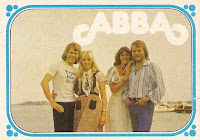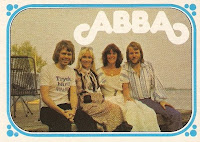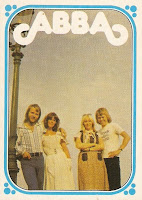Agnetha interviewed by Dutch magazine Panorama, during her promotional visit to Holland in 1983.

Agnetha has shaken off ABBA. Her own career is taking full precedence. Success seems to be assured in advance. However, ‘Europe’s sexiest bottom’ – her nickname in the American press – is not without problems. Fear of flying, the care for her children, the unknown destiny of the Swedish super group, the ongoing gossip and her own fear of failure are the most difficult obstacles on her path, that might lead her to Hollywood.
Everyone in the RAI Congress Centre in Amsterdam is fed up. The stars of the television gala 100 years ANWB are peeved, because the rehearsals aren’t running very smoothly. “If I had known this in advance...,” Julien Clerc sighs, expressing the general opinion among the artists.
The TROS TV orchestra – led by Harry van Hoof – isn’t feeling comfortable because some stars are using backing tapes. The technicians are walking around with sweaty hands, the live broadcast might be getting out of hand.
In the midst of a corny Ron Brandsteder who – together with Holland’s loveliest computer named Willy Dobbe – has been recruited to take care of the connecting chats and an impatient crowd of press hounds, there is still somebody who radiates friendliness and serenity: Agnetha Fältskog.
The blonde from ABBA has come to our country primarily to promote her single ‘The Heat Is On’. With an ultra-luxurious touring car, she met the press on the European continent the past few weeks. Travelling with the futuristic looking vehicle – that remained hidden away from curious eyes in the garage of the Sonesta hotel in the Dutch capital – is equipped with every possible convenience. Apart from a bar and a bathroom, the touring car has a complete videotheque and there are eight sleeping accommodations.
“This way of travelling is new for me,” Agnetha ascertains halfway her bus trip, “but it suits me very well. You are not bothered by waiting time at the airports and all the nervousness that goes with that and you arrive right in front of the door of your hotel. You don’t even notice that you are actually travelling. I prefer to spend my time in that bus than in this dressing room.”
After her personal manager Mary Anderson – daughter of ABBA boss Stig Anderson – has brought her a plate of vegetarian food and a cup of tea, she talks about her fear of flying while she eats. “That has been another reason for me to travel with that touring car. I can’t cope very well with flying. I always dread it.”
With the knowledge in her pocket that – due to her ABBA past – her success as a solo artist is practically guaranteed in Europe, Agnetha Fältskog (pronounced as Ageneitiea Felskoeë) has set her sights on America. ABBA has never been as successful there as they were in the rest of the world. With difficulty, only some of the compositions by Björn Ulvaeus and Benny Andersson made the top ten in the United States. However, her friend and colleague Frida (Anni-Frid Lyngstad, the dark-haired singer of the Swedish super group) suprisingly made it big on the American charts with her recently released solo album ‘Something’s Going On’.
Is there still some envy between the two ladies, about which so much has been written?
“Are you kidding? I think it’s fantastic what Frida has achieved together with Phil Collins (the producer). Her success only gives me a lot of confidence for my album. Even more so because my producer Mike Chapman (known from his work with Mud, Sweet, Suzi Quatro up till Blondie) knows the American market very well and he is very optimistic too.”

Frida is already preparing her second solo album in all silence. Even before the release of her album ‘Wrap Your Arms Around Me’, Agnetha is already thinking about her next project too. Therefore, ABBA seems to be on the sidetrack.
“That’s right,” she confirms in her velvety English, full of half incorrect accents. “The boys have taken on the task to write three hours of music for the musical they are going to create together with Tim Rice (Jesus Christ Superstar, Evita). This means that they won’t have any time to write songs for ABBA for the time being. I really don’t know if they ever will be up for that. Where ABBA is concerned, the future is widely open. We are not saying that we will continue, but we are not saying that it’s over either. I think that the development of our individual careers will be a deciding factor. And I know that it’s getting ever more difficult for Benny and Björn to write for ABBA. They are forced to come up with exceptionally good songs under that name. After ten busy years, that’s really a handicap for them. Everyone demands something new, something special. If they don’t deliver, then ABBA is cheap and the millionaires are only out to fill their pockets. To keep on distinguishing themselves, the boys will need more time, no matter what. According to me, being able to cope with this increasing pressure is far more imporant than for instance the internal personal relationships that leave nothing to be desired, by the way.”
Agnetha thinks it’s out of the question that the Swedish group will perform in the musical themselves. “That would be impossible for us. We would be obligated to perform night after night. None of us is keen on that. For the very reason that we didn’t want to be away from home for such a long time anymore, we decided not to go on tour anymore. We have really had our share the past few years. More than we could handle, because when we started out with ABBA, we actually only thought about making records. For me, we have always been more of a recording act than a concert attraction. Through our music and not least the promotional films, we have reached the top. The concerts in all kinds of countries were done because we wanted to meet the fans. For the moments of being on stage and feeling their support, I would want to go on tour again. That is the only reason for a tour. Opposed to that are many reasons not to do it. Like the preparations that take up a whole year and missing the children.”
She still meets Benny and Björn regularly. Delightedly, she talks about their compliments for her album, that was obviously recorded in their own Polar Music Studios in Stockholm. Agnetha has less contact with Frida since she moved to England to be able to follow the latest trends in pop music. The 33-year-old mother of Linda (10) and Christian (5) doesn’t have any similar plans.
“To England? No, if I would leave Sweden, I would move to a country with a nice climate. I feel best with the sun above my head. But I would have to give it some severe thought, if I had to pick a country. It’s nice to have sun every day, but you have to feel safe as well. That isn’t a problem in Sweden, but – apart from the weather – there are so many things that annoy me. But I don’t want to get into that. That’s purely a personal opinion. Apart from that, every country leaves something to be desired if you know it really well. The idea to move abroad won’t come up for discussion until the children are older and I will be less committed.”
Agnetha’s limited enthusiasm for her home country is partly caused by the ongoing pursuit of the gossip press. Her divorce from colleague Björn, her relationship with ice hockey star Lars- Erik Ericcson and her meanwhile cooled love for policeman Torbjörn Brander – initially the bodyguard of her children – turned Agnetha into the most important source of inspiration for all kinds of rumours and speculations. When her acting part as a pregnant woman in the Swedish movie Raskenstam was deliberately mixed up with her own life, she had enough of it.

A long letter to the editor of the biggest newspaper – Dagens Nyheter – under the device ‘know what you are reading, this is how some magazines practice their job in this country’, brought on a national discussion.
“I’m still proud of that, because more than ever people are now talking about getting back at the slanderers. It was crazy what they were writing about me. All kinds of people bothered me to ask me whether I was pregnant or not and why my boyfriend had left me.”
Fourteen years ago – when she just got back from a six month attempt to conquer Germany with her voice – Agnetha played one of the leading parts in the Swedish version of Jesus Christ Superstar. After that, there were the promotional films and ABBA – The Movie, but she didn’t get to serious acting until the filming of Raskenstam last year. The good experiences with actor and director Gunnar Helström in the movie about a national rascal that made love to every woman, has rekindled her love for acting.
“I don’t want to concentrate on just singing, but if it’s possible I want to develop as an actress as well. How the audience judges Raskenstam is just as important to me as the reception of my records. I am very curious about the reactions. I am very satisfied myself, but that isn’t saying much. But I will have to wait until its premiere after the summer. Fanny & Alexander is now very successful in the Swedish cinemas. That’s why our premiere has been postponed a couple of months. Depending on the success of Raskenstam, I will decide if I will accept other offers. There is one offer from abroad that is very interesting, but I’m not allowed to talk about it yet. I think that I can only accept an offer like that when I am believable with the people and not because I happen to be the blonde girl from ABBA.”
There’s a knock on the door. Mary is back again to take Agnetha. Doesn’t she ever get tired of this?
“I grew up in this atmosphere. My father, who managed a theatre company in Jönköping, sent me up on stage to sing at the age of six. After that, I always wanted to be a singer. And all that fuss surrounding it – like this – comes with the territory,” she smiles once more.
 With the catchy tune ‘The Heat Is On’, the solo career of ABBA singer Agnetha (33) has started successfully – but privately she isn’t that happy...
With the catchy tune ‘The Heat Is On’, the solo career of ABBA singer Agnetha (33) has started successfully – but privately she isn’t that happy...









































